June 15, 2025 | 16:45 GMT +7
June 15, 2025 | 16:45 GMT +7
Hotline: 0913.378.918
June 15, 2025 | 16:45 GMT +7
Hotline: 0913.378.918
In Tran Yen district, Yen Bai province, the commune of Quy Mong is a major place for the development of tropical fruit plants. Many families in the commune have progressively adopted the production of tropical fruit trees in accordance with VietGAP requirements in recent years, resulting in enhanced economic efficiency and product brand improvement.
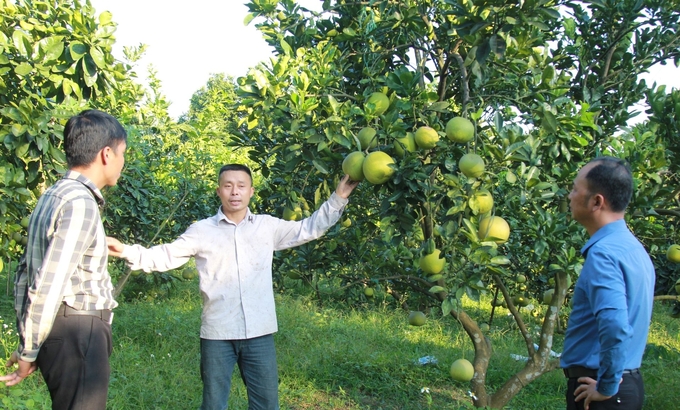
Quy Mong commune has nearly 70 households registered to produce fruit trees according to VietGAP standards. Photo: Thanh Tien.
Mr. Tran Manh Hien's family in Tan Thanh hamlet is one of the commune's long-standing pomelos cultivators. He makes about 100 million VND per year from his garden's 200 pomelo plants. Mr. Hien alternatively cultivates numerous pomelo kinds to fulfill consumer demand, including green-skinned pomelos, Cat Que pomelos, and Dien pomelos, among others.
Previously, Mr. Hien, like many other homes in the region, relied on experience and habits to apply chemical fertilizers and pesticides, with no scientific methodology. However, since engaging in technical training for cultivation in accordance with VietGAP guidelines three years ago, the procedure of planting and caring for pomelo trees in his family has drastically altered.
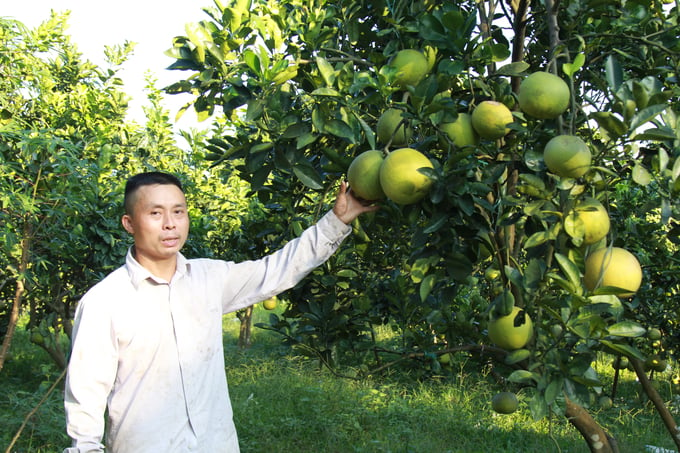
Grapefruit products of Mr. Tran Manh Hien (Tan Thanh village, Quy Mong commune) grown according to VietGAP standards are popular with customers. Photo: Thanh Tien.
Mr. Hien believes that farming fruit trees without the use of pesticides is almost difficult. The VietGAP standard reduces pesticide consumption by focusing on bio-based products to prevent and manage pests and illnesses. Pesticides are only used when necessary, when hazardous organisms surpass a certain threshold, and rigorous adherence to the application method and isolation periods is required. Pesticide usage must be documented and continuously monitored to guarantee customer safety and product quality.
Despite the hurdles and inconveniences, Mr. Hien claimed that using the VietGAP standard in farming has resulted in much better outcomes. Customers trust the fruits since they are fragrant and tasty, assuring food safety and cleanliness, and they may be sold at higher rates.
Mr. Hien's family, as well as many other households in Quy Mong commune, have successfully built pomelo growing methods that adhere to VietGAP criteria in order to attain excellent quality. People actively attempt to study and acquire strategies at each stage of tree development, from soil preparation to planting, fertilizing, trimming, and watering, and notably pest and disease avoidance.
Mr. Tran Xuan Thinh's family's pomelo growing model in Tan Thanh hamlet (Quy Mong commune) has moved from utilizing chemical fertilizers, stimulants, and pesticides to employing compost and different sorts of microbial preparations for pest avoidance. Weed management is accomplished during the care process solely by the use of periodic grass-cutting equipment to control and manage weeds, with no chemicals used.
Mr. Thinh's pomelo garden is lush, robust, and disease-free thanks to the meticulous use of the VietGAP farming procedure. The earth is rich in nutrients and fruitful.
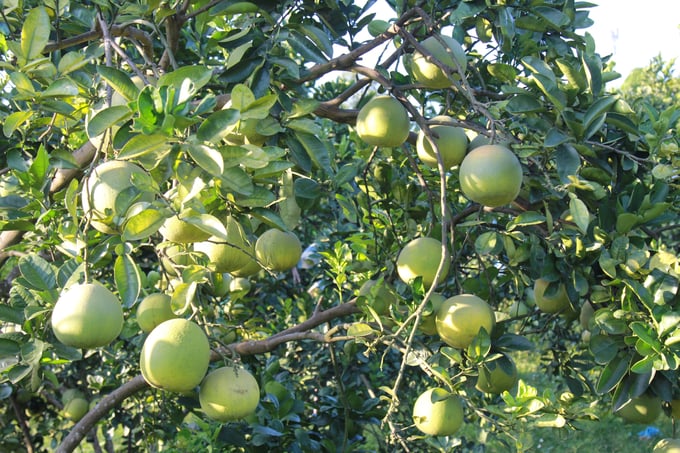
Thanks to switching to cultivation according to VietGAP standards, grapefruit has a beautiful design, delicious quality, and more flavor. Photo: Thanh Tien.
"Most of the fruit tree area is planted in the garden near the house," Mr. Thinh explained, "so applying VietGAP production, limiting pesticide use, ensures a safe living environment." I need to spend more time in the pomelo garden, studying every symptom of pests and illnesses in order to prevent them from spreading. Pruning branches and buds to assist pomelo trees grow properly, feeding with organic fertilizer at the appropriate periods of growth and development to assure fragrant and tasty fruit."
Since 2021, the commune authorities have encouraged families to form the Quy Mong Tropical Fruit Cooperative in order to increase the value of tropical fruit trees and build a connected chain of production. The cooperative has 30 members and around 70 houses that collaborate on production. Members of the cooperative collaborate to produce pomelo goods in a closed value chain, from cultivation and care to product consumption.
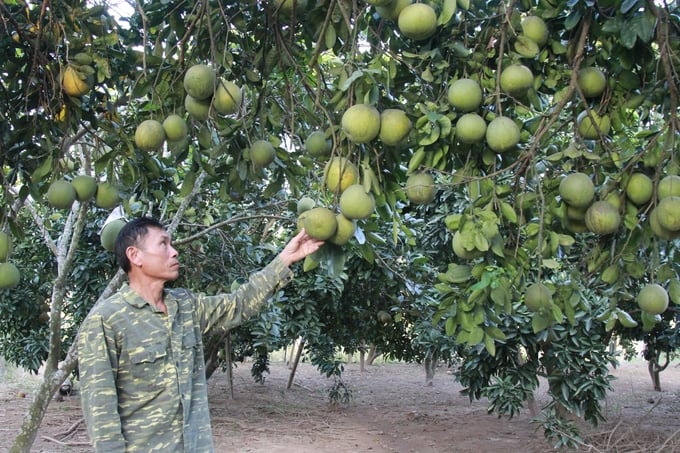
Mr. Do Xuan Sang - Director of Quy Mong Fruit Cooperative is one of the initiators of the VietGAP grapefruit production movement. Photo: Thanh Tien.
Mr. Do Xuan Sang, the Cooperative's Director, explained that in order to produce pomelos in accordance with VietGAP requirements, all cooperative members must take training and rigorously follow to the care procedure. They use scientific and technological advances to assure food safety while meeting market needs. Furthermore, the alliance intends to gradually extend cultivated areas and identify stable customer markets in order to enhance the lifestyles of fruit tree producers.
Currently, over 70 households in Quy Mong commune are farming pomelos that satisfy VietGAP requirements, including Din pomelos, green-skinned pomelos, Cat Que pomelos, and scarlet pomelos, among others. Quy Mong pomelo goods are traceable thanks to origin labels, packaging, and labeling that fit client requirements. Quy Mong's pomelo goods have been designated as OCOP (One Commune, One Product) and are marketed not just locally but also through social media platforms like as Facebook, the e-commerce platform Shopee, and the cooperative's website, therefore extending the market for their products.
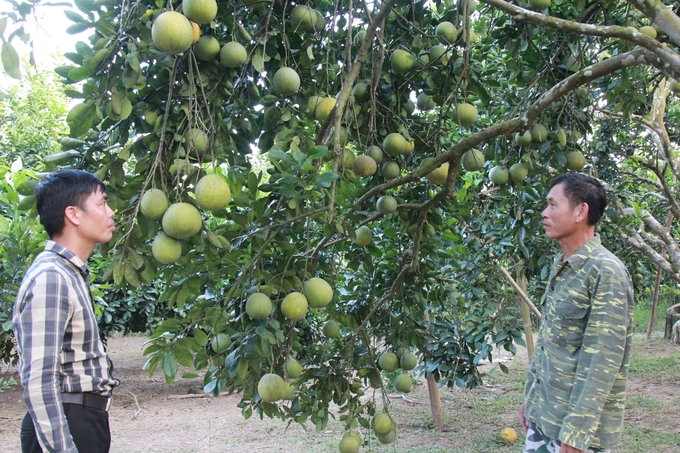
Focusing on organic production and VietGAP standards is the direction for developing fruit trees in Quy Mong commune. Photo: Thanh Tien.
According to Mr. Phung Tien Hien, Vice Chairman of the People's Committee of Quy Mong commune, Quy Mong now boasts almost 90 hectares of various types of fruit-bearing trees, with over 30 hectares dedicated to VietGAP-standard pomelo production. The commune authorities have provided circumstances to assist families in attending training courses and transferring scientific and technological information in order to boost production and product quality. Furthermore, the commune focuses on distributing knowledge and encouraging people to convert inefficient paddy fields, orchards, and sloping areas into farming regionally beneficial crops, notably various types of fruit-bearing trees, in order to increase income levels.
Translated by Linh Linh
/2025/06/12/3721-2-202745_83.jpg)
(VAN) TH made an impression at Seoul Food 2025 with its line of natural beverages, paving the way for Vietnamese food products to enter the South Korean market.

(VAN) Soc Trang's success in rice exports stems from a strategy of developing fragrant and specialty rice cultivation areas and standardizing production toward low-emission practices.
/2025/06/11/1311-5-120811_839.jpg)
(VAN) The pig farming industry is facing the challenge of comprehensive restructuring to meet requirements for quality, safety, traceability, and market expansion both domestically and for export.

(VAN) Vietnam considers participating in ALGROALBA in order to expand agricultural production, coordinate the assessment and effective exploitation potential land.
/2025/06/05/5314-1-184727_407.jpg)
(VAN) From seemingly worthless fish scales and skin, enzymes and lactic ferments can transform by-products into peptides, opening a sustainable, effective business direction and elevating Vietnamese seafood.

(VAN) TTC AgriS and IFC signed a strategic partnership to develop a sustainable agricultural value chain, aiming to achieve the Net Zero target by 2035.

(VAN) Seafood by-products are opening a new path, combining green growth and technological innovation to enhance the industry's value.